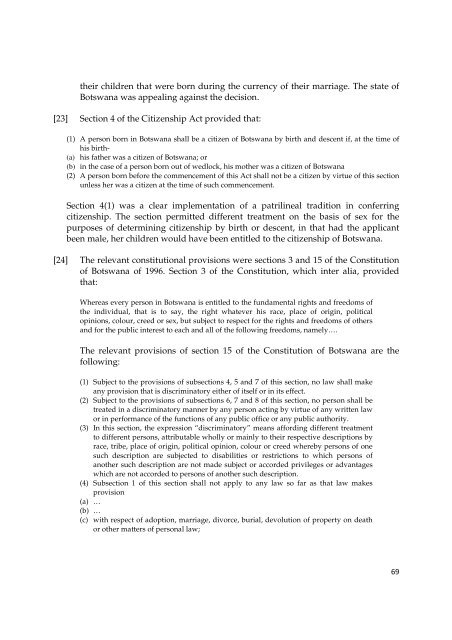sexual health and human rights in the african region - The ICHRP
sexual health and human rights in the african region - The ICHRP
sexual health and human rights in the african region - The ICHRP
You also want an ePaper? Increase the reach of your titles
YUMPU automatically turns print PDFs into web optimized ePapers that Google loves.
<strong>the</strong>ir children that were born dur<strong>in</strong>g <strong>the</strong> currency of <strong>the</strong>ir marriage. <strong>The</strong> state of<br />
Botswana was appeal<strong>in</strong>g aga<strong>in</strong>st <strong>the</strong> decision.<br />
[23] Section 4 of <strong>the</strong> Citizenship Act provided that:<br />
(1) A person born <strong>in</strong> Botswana shall be a citizen of Botswana by birth <strong>and</strong> descent if, at <strong>the</strong> time of<br />
his birth-<br />
(a) his fa<strong>the</strong>r was a citizen of Botswana; or<br />
(b) <strong>in</strong> <strong>the</strong> case of a person born out of wedlock, his mo<strong>the</strong>r was a citizen of Botswana<br />
(2) A person born before <strong>the</strong> commencement of this Act shall not be a citizen by virtue of this section<br />
unless her was a citizen at <strong>the</strong> time of such commencement.<br />
Section 4(1) was a clear implementation of a patril<strong>in</strong>eal tradition <strong>in</strong> conferr<strong>in</strong>g<br />
citizenship. <strong>The</strong> section permitted different treatment on <strong>the</strong> basis of sex for <strong>the</strong><br />
purposes of determ<strong>in</strong><strong>in</strong>g citizenship by birth or descent, <strong>in</strong> that had <strong>the</strong> applicant<br />
been male, her children would have been entitled to <strong>the</strong> citizenship of Botswana.<br />
[24] <strong>The</strong> relevant constitutional provisions were sections 3 <strong>and</strong> 15 of <strong>the</strong> Constitution<br />
of Botswana of 1996. Section 3 of <strong>the</strong> Constitution, which <strong>in</strong>ter alia, provided<br />
that:<br />
Whereas every person <strong>in</strong> Botswana is entitled to <strong>the</strong> fundamental <strong>rights</strong> <strong>and</strong> freedoms of<br />
<strong>the</strong> <strong>in</strong>dividual, that is to say, <strong>the</strong> right whatever his race, place of orig<strong>in</strong>, political<br />
op<strong>in</strong>ions, colour, creed or sex, but subject to respect for <strong>the</strong> <strong>rights</strong> <strong>and</strong> freedoms of o<strong>the</strong>rs<br />
<strong>and</strong> for <strong>the</strong> public <strong>in</strong>terest to each <strong>and</strong> all of <strong>the</strong> follow<strong>in</strong>g freedoms, namely….<br />
<strong>The</strong> relevant provisions of section 15 of <strong>the</strong> Constitution of Botswana are <strong>the</strong><br />
follow<strong>in</strong>g:<br />
(1) Subject to <strong>the</strong> provisions of subsections 4, 5 <strong>and</strong> 7 of this section, no law shall make<br />
any provision that is discrim<strong>in</strong>atory ei<strong>the</strong>r of itself or <strong>in</strong> its effect.<br />
(2) Subject to <strong>the</strong> provisions of subsections 6, 7 <strong>and</strong> 8 of this section, no person shall be<br />
treated <strong>in</strong> a discrim<strong>in</strong>atory manner by any person act<strong>in</strong>g by virtue of any written law<br />
or <strong>in</strong> performance of <strong>the</strong> functions of any public office or any public authority.<br />
(3) In this section, <strong>the</strong> expression “discrim<strong>in</strong>atory” means afford<strong>in</strong>g different treatment<br />
to different persons, attributable wholly or ma<strong>in</strong>ly to <strong>the</strong>ir respective descriptions by<br />
race, tribe, place of orig<strong>in</strong>, political op<strong>in</strong>ion, colour or creed whereby persons of one<br />
such description are subjected to disabilities or restrictions to which persons of<br />
ano<strong>the</strong>r such description are not made subject or accorded privileges or advantages<br />
which are not accorded to persons of ano<strong>the</strong>r such description.<br />
(4) Subsection 1 of this section shall not apply to any law so far as that law makes<br />
provision<br />
(a) …<br />
(b) …<br />
(c) with respect of adoption, marriage, divorce, burial, devolution of property on death<br />
or o<strong>the</strong>r matters of personal law;<br />
69
















